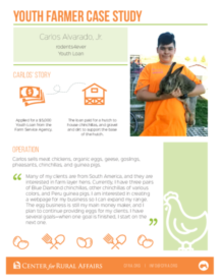Carlos sells meat chickens, organic eggs, geese, goslings, pheasants, chinchillas, and guinea pigs.
Operation
Many of my clients are from South America, and they are interested in farm layer hens. Currently, I have three pairs of Blue Diamond chinchillas, other chinchillas of various colors, and Peru guinea pigs. I am interested in creating a webpage for my business so I can expand my range. The egg business is still my main money maker, and I plan to continue providing eggs for my clients. I have several goals—when one goal is finished, I start on the next one.
Challenges
At first, I was unknown in my area, and it was difficult to sell my products, but little by little, through word of mouth, I started getting a following because of the quality of my eggs. I had problems with some neighbors who didn’t want animals next door to them. That tension was hard for me, but I kept focusing on my business. This year, my greatest challenge was the flooding because I lost more than 30 animals, but I stayed positive.
Recommendations to USDA agents
I would recommend for the U.S. Department of Agriculture (USDA) to promote youth loans more. More visibility could help more youths learn about this opportunity and other services the organization offers. Word of mouth is good, but outreach using other means would definitely help others be introduced to USDA.
If I hadn’t heard about this service from the Center for Rural Affairs, attending their workshops and meeting the agent, I doubt I would’ve applied for the youth loan.
His experience
The agent worked with our schedule. He was very knowledgeable and patient with explaining the application process. If he hadn’t taken the time to explain the process, I would not have felt comfortable applying for the loan.
Advice to someone considering a Farm Service Agency loan
It’s the best investment they can make. Young people need to be supported so they can have a thriving business. This program, along with support from their parents, can help them reach their goals.
This case study was produced with funding through the U.S. Department of Agriculture’s Outreach and Assistance for Socially-Disadvantaged Farmers and Ranchers (2501 Program) and Veteran Farmers and Ranchers Program. The Center for Rural Affairs is an equal opportunity provider and employer.


